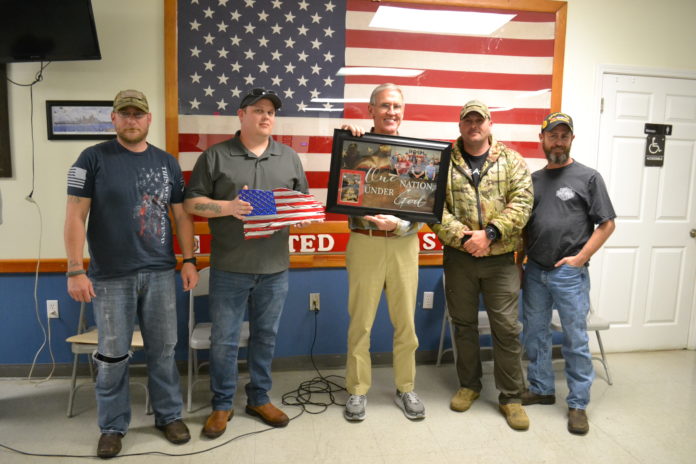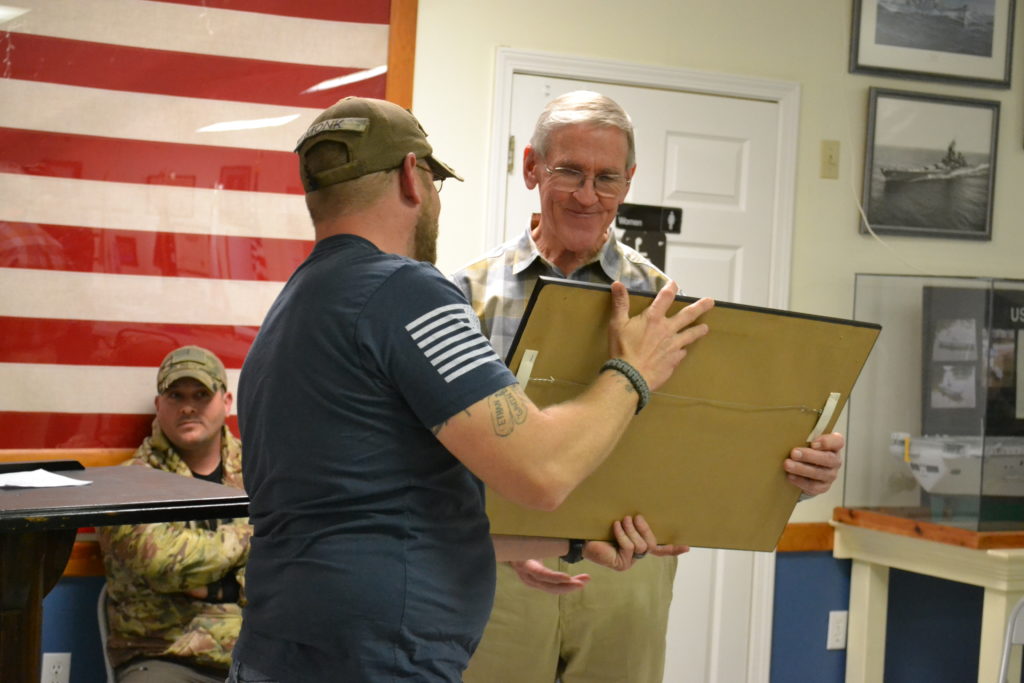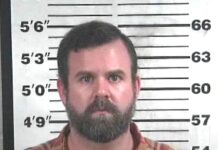
CORRECTION- 3-11-20 at 6:55 p.m.
In The Tribune’s coverage of the stellate ganglion block (SGB) shot, we have said, “The SGB shot is FDA-approved.” In fact, the medications administered through the shot are FDA-approved. The shot itself does not require FDA approval.
CULLMAN, Ala. – A new treatment for post-traumatic stress disorder (PTSD) is being used to treat veterans: the stellate ganglion block (SGB) shot. Local nonprofit Saving Forgotten Warriors (SFW) officially launched the local effort, the “800 Club,” Dec. 12, 2019, with a $12,000 donation from Apel Steel. So far, 10 local veterans have received the treatment, with all reporting dramatic success. On Tuesday, four of those veterans shared their testimonies at the Cullman VFW.
The 800 Club earned its name from the shot costing $800. Apel Steel President Ronny Steel was honored by those four veterans at the event. Apel was presented with a photo of the veterans his donation helped, as well as a sculpted metal American flag.
The SGB shot is now being given at military hospitals, but the procedure has not yet been made available to VA hospitals around the country.
Retired Col. Ken Brown provided context before the four gave their testimonies, saying, “The purpose of this presentation is to thank one of our citizens who has stepped up to help us finance the effort to get some of our veterans up to Annapolis, Maryland, to get the SGB shot. Back in December, we had the opportunity for a couple of our veterans to go up to Annapolis, Maryland to retired Navy Seal Dr. Sean Mulvaney to get a shot that has been perfected by him and others. It is a shot in the neck; it’s administered to the stellate ganglion nerve in the neck which controls the fight or flight mechanism, and basically what it does, for those who are suffering from PTSD, is it resets or ‘reboots’ the nervous system and basically resets it back to the way it was normally before whatever trauma they experienced took place. A lot of our veterans who have been suffering for years and years with PTSD have been getting treatment through the VA, a long process of drug treatment and counseling and they’ve had about a 30-40% success rate with that.
“We have 22 veterans a day across the United States with PTSD committing suicide. Every day- 22 a day, committing suicide. That’s over 8,000 folks a year committing suicide, and so many other are thinking about it but haven’t done it yet. A lot of these young men and women have stepped up to serve, they’ve been on two or three combat tours, they’ve seen a lot of things that none of us should ever have to see and it’s very difficult with them to deal with the effects of PTSD. I have four of the veterans here that recently went up to Annapolis, Maryland and received the SGB shot thanks to one of our local citizens. They’re going to share how it affected each of their lives and how it changed their lives.”
The veterans requested to remain anonymous.
First testimony
“I went to Iraq in 2007-08 and did convoy missions with gun trucks and went from the bottom to the top and east and west, so there were a lot of things that I had to do to get back here to my family. I have six kids and we’re seven months pregnant with one on the way.
“A little on the shot and how it helped me- my youngest son is 11. I gave him anxiety when he was 7. He was eaten up with anxiety because of my PTSD. Because of my angry outbursts, because I would leave from home and not come back. I went through a drinking spell thinking it was a cure; it helped in the moment, but I still had to face everything when it was done and over with. I was just this big ball of rage. I didn’t know if I could continue being here at the VFW, because it was stressing me out and there was no need for it to stress me out because I love it.
“After the shot, it’s like this big weight is lifted off your shoulders. I work three days a week delivering to convenience stores in Huntsville and Madison. I deal with a lot of crazy people at those stores. Normally on my way to all that, I’m just (on edge), I don’t know what’s going to happen next, I’m always on my guard and I feel, my body feels like someone beat me up. After the shot, I get there when I get there. I do my thing. I’m not worried about anything. Somebody does something, I’ll just look at them and laugh.
“My kids call me ‘Dad 2.0’ and they’ll mess with me and try to get into an argument on purpose and when I go to get onto them, they say, ‘Well wow you have been done a little different,’ because normally I would be straight to the point and go, ‘Hey, stop that.’ The shot works. I feel like a new person. I’m calmer; I’m not worried about stuff. I’m still on my guard, you know? I didn’t lose my fight-or-flight response, but I just handle things differently. It was a big reset for me. I will do anything I can for any veteran to go; it’s a life-changer. I have not slept a full night since I have come back from overseas. The second night that we got the shot, it didn’t matter if I went to bed at 12 and had to get up at 4, I didn’t wake up, and when I woke up it didn’t feel like someone was punching me in the sides. I didn’t fight in my sleep. Now my wife can’t sleep because I’m over there like a baby snoring away, but I can get up and do what I need to do in my everyday tasks. I would recommend it to anybody.”
Second testimony
“Before this shot, this wouldn’t happen. I was pretty much a total recluse. If I had to go out into town, I would go directly where I needed to go, directly to what I needed and directly out of where I was and go back home and lock myself in the house. I couldn’t be around crowds, the Christmas parade, I’d take my kids to that every single year, and every single year, my wife has had to leave my kids with the in-laws because they had to get me out of there and back to the house so I could my medication and try to calm down. I couldn’t do crowds.
“After the shot… my wife and I decided to drive ourselves up there (to Annapolis) and have a time out of it. We actually went through D.C. and we stayed in D.C. for a couple of days. I was able to go through some of the museums without freaking out, without worrying about who was coming up behind me or having to look for every single exit. Now, I knew where those were, it’s still there because it’s been ingrained into us so much. I knew where it was, but I wasn’t fixated on it. I was able to enjoy myself for the first time in almost 15 years.
“I went to Afghanistan twice, once in 2002-03 and again in 2005-06. While I was over there the first time, I was with the infantry unit and I was a radio operator. I saw a lot of things that a person normally in my position wouldn’t have to see and did a lot of things I probably shouldn’t have done. Since I’ve been back, even my temper, I used to run at- 99 was my anxiety level. Now, my kids get into an argument and I’m actually able instead of flying off the handle and yelling at them immediately, I’m able to take those steps of escalation and start off at the bottom. Driving through D.C., I was probably at a two the entire time I was driving, and if any of you have ever been up towards like that, it’s not a fun place to drive. Even going to the VA before the shot, I’d have to either pull over or leave an hour and a half or two hours early to get to the parking deck so I could just calm down before I got on that bus to go to the VA, and all of that has just subsided now and I’m actually able to, like I said, enjoy myself for the first time in 15 years.”
Third testimony
“Pretty much like everyone else has said, it felt like a huge weight was lifted off your shoulders. The night before the shot, I kind of talked myself out of it. I really didn’t want to get it done. I didn’t trust the doctors taking a needle in my neck. Not really knowing everything, I stayed up the whole night.
“Finally came up for my turn to get the shot, the doctor came in and we talked for about 20-30 minutes and he gave me the first shot in my neck. The first shot pretty much put me a bit more heightened than what I was before I went in; I was more nervous as he was giving me the shot. I felt myself come out of the blue. When he gave me the second shot, I really can’t put into words what it felt like, but if an angel were to come down from heaven and reach into my soul and just pull it up, that’d be the only way to describe the shot.
“Those that have been in combat, those who have experienced multiple, multiple, multiple traumas, it’s not just one, you know our firefighters, our police officers, our trauma nurses in the emergency room, they deal with the same thing. It was hard for me to believe that just a shot is going to cure things, it’ll make things better. The VA has been throwing me medicine for the last 15 years and it came to a point last January where I got to the point where I was ready to end it. Went to the whole VA thing, put myself through the PTSD program in Tuscaloosa. I came back and was working on myself and there were still things I’m working on that just don’t seem like it’s working. After this shot, I haven’t taken any of antidepressants, I haven’t taken any of my sleeping medicine. I sleep a full night through and I’m not waking up in cold wet sweats in the middle of the night wondering how I got like that. This shot’s really working. I would recommend this shot to anybody who’s dealt with any trauma.”
Fourth testimony
“This shot did wonders. Normally on an occasion, I wouldn’t stand up and talk in front of crowds; I would go and be a recluse. I would be seriously, seriously be in trouble right now. My anxiety would be through the roof. The shot has calmed me down. It’s helped me to roll things off of my shoulders. It’s almost like I don’t care to let things bother me now.
“Before the shot, I would yell and scream at people in traffic. I’d probably run somebody off the road if they made me mad. Things have drastically changed. I actually sleep. I don’t wake up in a bad mood. My kids, the thing that won it for me, my kids were telling me, ‘Hey, you’ve would’ve normally gotten really mad over this.’ Like this morning, when I was taking them to school, one of my boys spilled green tea all over my truck and I was like, ‘Okay, no big deal, it is what it is, let’s clean this up,’ and he said, ‘Hey, you would normally yell at us for that, something’s changed, you would’ve been screaming,’ and I said, ‘No I wouldn’t! I wouldn’t have done that!’ All three of my boys went, ‘Oh yeah, you’d be screaming at us.’
“So, for my kids to see it, for my wife to see it, I’m able to feel to like I love my wife more and I feel like I’m able to love my kids more. I’m spending more time with them. I’m not easily agitated by the small things that used to eat me up inside. I’m going to advocate for this shot as much as I possibly can. I do believe that if I can feel the way that I feel, then these other veterans deserve to feel the same way.”
How to donate or get help
SFW is a 501(c)(3) nonprofit, and any donation is tax-deductible. Donations can be mailed to P.O. Box 1002, Cullman, AL 35056. If you, or someone you know, is a veteran in need, contact SFW at 256-747-5006. Veterans in crisis can also text “888” to SFW Founder Jeremy Hogan directly at any time at 256-347-2001. Find out more at www.savingforgottenwarriors.com.
Copyright 2020 Humble Roots, LLC. All Rights Reserved.





















